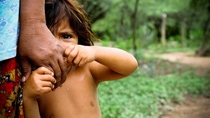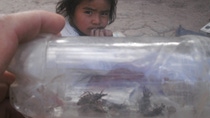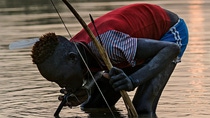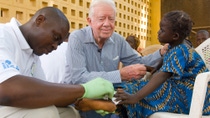Chi siamo
Rooting out the kissing bug

In cooperation with the Argentinian Ministry of Health, BASF is committed to control the neglected tropical disease Chagas.
The “kissing bug” sounds harmless enough, but it is an insect whose bite can be dangerous, if not deadly. That is because it carries with it the parasite that causes Chagas, a disease that starts with swelling of the eyelids, fever and fatigue, but can lead to malnutrition, cardiac disorders and even heart failure. It is considered primarily to be a disease of poverty, but there have also been significant numbers of cases in Europe and the United States, caused by travel and blood transfusion.
Triatoma infestans – to give the insect its scientific name – is endemic in many areas in Latin America, where it is also known as Vinchuca. WHO estimates that 8 million people are affected by it here. One example is Chaco, a province in the remote north east of Argentina. Here, the small town of Concepción del Bermejo is home to around 10,000 people, many of whom live in extreme poverty with inadequate access to clean water, healthcare, education and decent housing. The incidence of Chagas has been high among adults and children, with many of the roughly 170 rural dwellings and a large number of the 1,900 urban homes infested by the blood-sucking insects.
Since 2010, BASF Argentina has been committed to the community-based project “Vamos por nuestro país” (Let’s go for our country) in this area. In cooperation with the National Chagas Disease Program of the Argentinian Ministry of Health, the project utilizes BASF’s existing knowledge and state-of-the-art technology to help control, monitor and treat the disease. “‘Vamos por nuestro país’ is different from other programs because it is sensitive to the needs of the people affected by Chagas. No one else meets those needs,” explains Marcelo Hoyos, technical marketing manager for BASF’s Pest Control Solutions business and one of the 50 BASF volunteers from different business units in Argentina who, together with their families, have committed to this project. As part of the three-year program, which has now been extended to run a further year until July 2014, BASF Argentina is not only supplying Fendona® – an insecticide which can safely be sprayed inside homes – it is also providing its expertise to the local authorities and local people.
A vital part of the program is to increase people’s understanding of Chagas, to encourage the proper use of medicines and the insecticide, and to foster active community engagement. A network of strategic partners has been created, including the regional government, institutions in the town such as the hospital and school, and Solidagro – an NGO specializing in local development. Training courses are run for local people explaining how to stop the bugs from breeding inside their homes and contaminating food and kitchen utensils.
An innovative online management system has been developed for monitoring progress and the knowledge gained is being exchanged with other municipalities, provincial authorities and NGOs to produce a joint study of best practices. The results so far have been encouraging. The proportion of infected houses in the rural area has been reduced from 17.9% in 2010 to 2.9% outdoor and 0% indoor infestation in 2013.

“Vamos por nuestro país” is a self-sustaining project that will permit continuity and outreach to other communities after BASF’s participation and can serve as a template for other programs tackling insect-borne diseases.
The experience of being involved in this award-winning project has had a huge impact, says BASF employee Hoyos. “We have seen that we can help people to help themselves and it has taught me to re-evaluate the importance of the family and education as the basis for improving the quality of life. But the battle has only just begun!”

